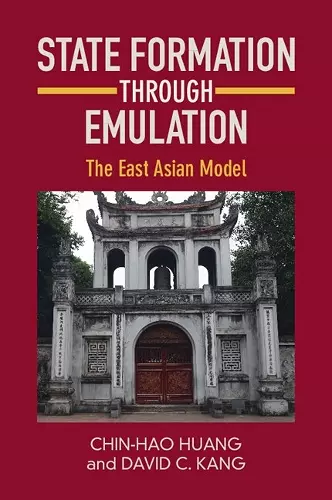State Formation through Emulation
The East Asian Model
David C Kang author Chin-Hao Huang author
Format:Paperback
Publisher:Cambridge University Press
Published:4th Aug '22
Currently unavailable, and unfortunately no date known when it will be back
This paperback is available in another edition too:
- Hardback£79.99(9781009098533)

Argues that states formed in East Asia a thousand years earlier than in Europe, emulating China rather than competing with it.
This book counters the conventional narrative of state formation, which overlooks the fact that state bureaucracies in East Asia had emerged 1,000 years earlier than in Europe. It argues that state formation in Korea, Japan, Vietnam occurred through emulation of China—the hegemon with a civilizational influence—not in direct competition with it.Neither war nor preparations for war were the cause or effect of state formation in East Asia. Instead, emulation of China—the hegemon with a civilizational influence—drove the rapid formation of centralized, bureaucratically administered, territorial governments in Korea, Japan, and Vietnam. Furthermore, these countries engaged in state-building not to engage in conflict or to suppress revolt. In fact, war was relatively rare and there was no balance of power system with regular existential threats—the longevity of the East Asian dynasties is evidence of both the peacefulness of their neighborhood and their internal stability. We challenge the assumption that the European experience with war and state-making was universal. More importantly, we broaden the scope of state formation in East Asia beyond the study of China itself and show how countries in the region interacted and learned from each other and China to develop strong capacities and stable borders.
International Relations needs to move beyond critiques of Eurocentrism to present big, positive alternative ideas. Few if any books in the field achieve this goal as well as State Formation in Historical East Asia. Huang and Kang's fresh, challenging and incredibly important thesis is that state-building in East Asia preceded that in Europe, and was the result of emulation rather than military competition. Jason Sharman, Sir Patrick Sheehy Professor of International Relations, University of Cambridge
This innovative analysis demonstrates that state building in Asia was very different from Europe: characterized by mimicry and diffusion, rather than warfare or competition. It is a major and very welcome contribution to the literature on state-building across the world. Anna Grzymala-Busse, Kevin and Michelle Douglas Professor of International Studies, Stanford University
Huang and Kang have reconstructed deep historical pathways toward state making in East Asia. They helpfully highlight shared traits that distinguish these states as a group from those formed in Europe. State Formation Through Emulation: The East Asian Model helps to reduce the persistent asymmetry of knowledge about European and East Asian state making dynamics. The book points us toward to a future moment when historically contextualized state making dynamics across different world regions can be scrutinized for the distinctive features these diverse states bring into their subsequent encounters with each other. R. Bin Wong, R. Bin Wong, Director of the UCLA Asia Institute and Distinguished Professor of History, University of California, Los Angeles
ISBN: 9781009096317
Dimensions: 228mm x 152mm x 14mm
Weight: 380g
270 pages